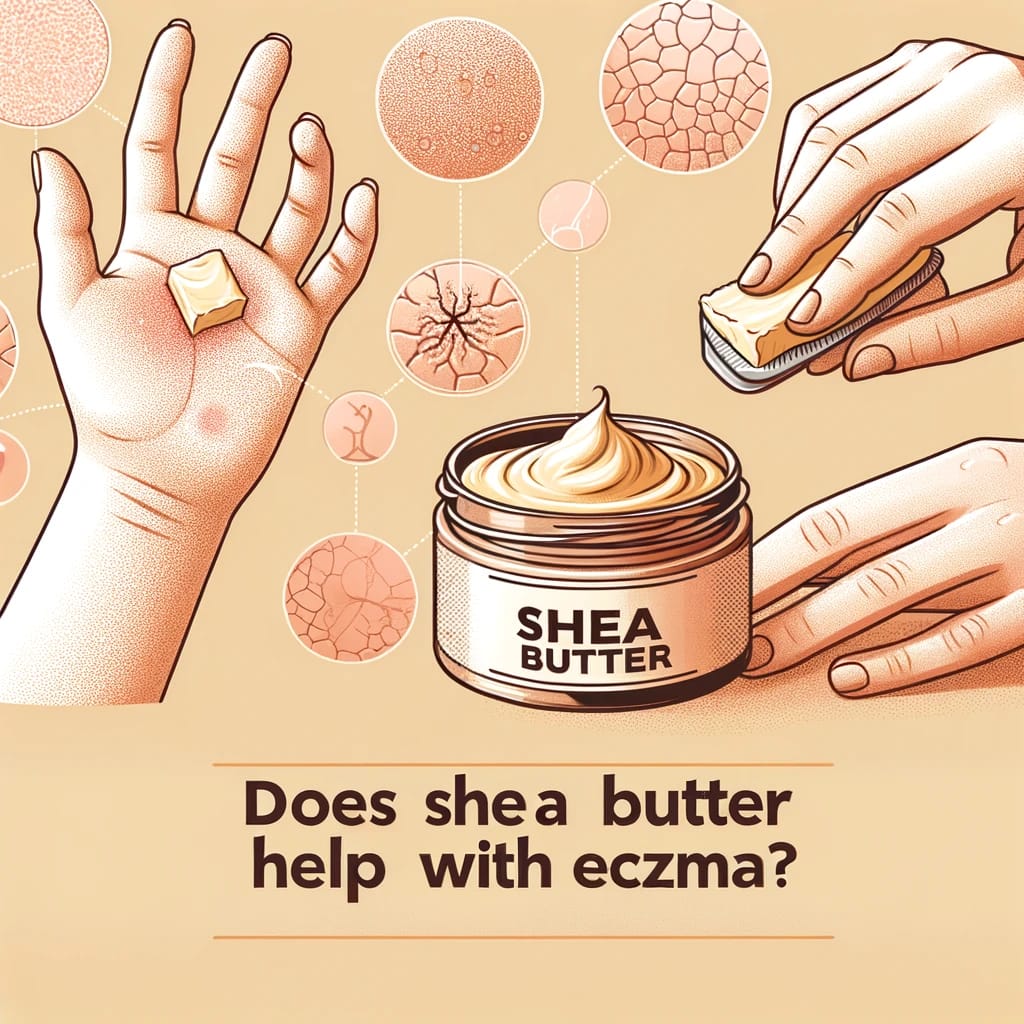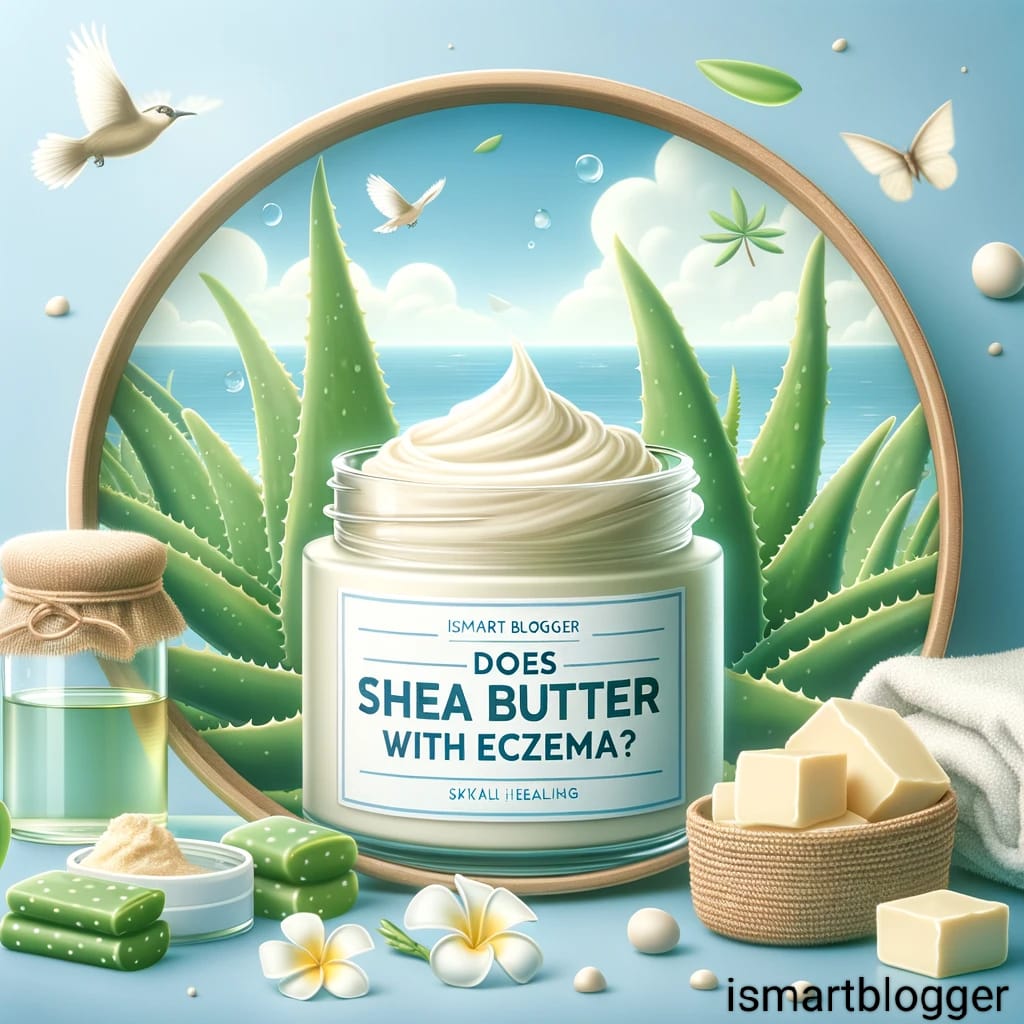Introduction
Eczema, also known as atopic dermatitis, is a chronic inflammatory skin condition that affects millions of people worldwide. It is characterized by red, itchy, and inflamed patches of skin that can be intensely uncomfortable and even debilitating at times.
Those who suffer from eczema experience a range of symptoms, including dryness, scaling, blistering, oozing, and crusting. These symptoms often lead to significant distress both physically and emotionally.
In recent years, there has been a growing interest in natural remedies for eczema as individuals seek alternatives to conventional treatments that may come with adverse side effects or provide only temporary relief. This shift towards natural approaches stems from a desire for gentler and more holistic solutions that address the root causes of eczema rather than just suppressing its symptoms.
It is within this context that shea butter has emerged as a compelling option for managing eczema symptoms. Derived from the nuts of the Shea tree (Vitellaria paradoxa), shea butter has been valued for centuries in Africa for its medicinal properties.
With its remarkable composition and unique combination of vitamins, fatty acids, and other bioactive compounds, shea butter has shown promise in alleviating eczema symptoms and promoting healthier skin. In light of this evidence, it can be argued that shea butter offers significant benefits as a treatment option for individuals with eczema.

Brief explanation of Eczema and its Symptoms
Eczema is a complex condition characterized by an impaired skin barrier function and dysregulated immune responses. It typically manifests in early childhood but can persist into adulthood or emerge later in life. The exact causes are not fully understood; however genetic factors, environmental triggers such as allergens or irritants (e.g., pollen, pet dander), stress levels, hormonal imbalances, and even climate conditions can contribute to the development and exacerbation of eczema.
The symptoms of eczema can vary widely from person to person, but they often involve redness, intense itching, dryness, and inflammation. Affected skin areas may become rough, scaly, and even cracked or blistered in severe cases.
The constant urge to scratch can further complicate the condition, leading to a vicious cycle of skin damage and increased inflammation. The impact on quality of life can be significant, with sleep disturbances and emotional distress being common consequences.
Mention of the growing interest in natural remedies for eczema
The conventional approach to managing eczema primarily involves the use of topical corticosteroids or immunosuppressants that aim to reduce inflammation and control symptoms. While these medications can be effective in providing short-term relief, concerns about potential side effects like thinning skin or rebound flare-ups have led individuals with eczema to seek alternative treatments.
This has fueled a surge in interest in natural remedies that offer gentler yet effective approaches for managing the symptoms of eczema without the potential risks associated with the long-term use of pharmaceutical interventions. People are increasingly turning their attention towards botanical extracts, essential oils, and plant-based ingredients that boast therapeutic properties targeting inflammation reduction and skin hydration.
Among these natural alternatives gaining attention is shea butter due to its powerful moisturizing properties and its purported ability to promote healing while soothing irritated skin. This growing interest reflects a broader shift towards embracing nature’s remedies as individuals seek long-term solutions that foster healthy skin rather than just temporarily masking symptoms.
Overview of Shea Butter
Definition and Origin of Shea Butter
Shea butter, scientifically known as Butyrospermum parkii, is a natural fat extracted from the nuts of the shea tree, which is native to Africa. The word “shea” comes from the Bambara language spoken in Mali, where the tree is abundant. For centuries, shea butter has been used by African communities for its numerous benefits in skincare and h.
The extraction process involves collecting mature shea nuts that have fallen from the trees. The nuts are then carefully cracked open to reveal their kernels, which are roasted and ground into a paste.
This paste is kneaded and boiled in water until the butter separates and rises to the surface. After cooling and solidifying, the shea butter is manually collected and traditionally used or further processed for commercial use.
Extraction Process and Different Types (Refined vs Unrefined)
There are two primary types of shea butter: refined and unrefined. Refined shea butter undergoes additional processing steps to remove impurities, scent, and color. This refining process typically involves bleaching, deodorizing, or adding chemicals like hexane for a smoother texture.
While refined shea butter may have a longer shelf life due to its removal of natural components that can cause rancidity, it also loses some of its beneficial properties during this refining process. On the other hand, unrefined or raw shea butter retains its natural color, scent, and nutrients as it undergoes minimal processing.
It is typically filtered through cheesecloth to remove any plant debris while preserving its integrity. Unrefined shea butter maintains its higher concentration of vitamins A and E along with essential fatty acids like stearic acid and oleic acid.
Composition of Shea Butter (Vitamins, Fatty Acids, etc.)
Shea butter is renowned for its rich composition of vitamins, fatty acids, and other beneficial compounds. It contains high levels of vitamin A, which promotes healthy skin cell growth and aids in the repair of damaged skin.
Vitamin E acts as a powerful antioxidant that protects the skin from free radicals and environmental stressors. Furthermore, shea butter is abundant in essential fatty acids such as oleic acid (omega-9) and stearic acid.
These fatty acids help to nourish and moisturize the skin deeply. The presence of linoleic acid (omega-6) contributes to maintaining the skin’s natural barrier function, preventing moisture loss and promoting smoothness.
In addition to these components, shea butter also contains natural plant sterols with anti-inflammatory properties that help calm irritated skin. This combination of vitamins, fatty acids, and bioactive compounds makes shea butter an exceptional ingredient for skincare products aimed at improving various skin conditions like eczema.
Understanding Eczema Definition and Common Types of Eczema:
Eczema, also known as atopic dermatitis, is a chronic inflammatory skin condition that affects millions of people worldwide. It is characterized by patches of red, dry, itchy, and inflamed skin.
While the exact cause of eczema remains unknown, researchers believe it is a combination of genetic and environmental factors. There are several common types of eczema, with atopic dermatitis being the most prevalent form.
Atopic dermatitis often starts in infancy or childhood and can persist into adulthood. Other types include contact dermatitis (caused by an allergic reaction to specific substances), nummular eczema (circular or coin-shaped patches), and seborrheic dermatitis (affecting areas rich in oil glands like the scalp).
Causes and Triggers of Eczema Flare-Ups:
Eczema flare-ups can be triggered by various factors, making it challenging to manage the condition effectively. Genetics play a significant role in determining susceptibility to eczema; if one or both parents have eczema or other allergic conditions like asthma or hay fever, there is an increased likelihood of developing eczema.
Additionally, allergens such as certain foods (dairy products, eggs) or airborne irritants (pollen, pet dander) can trigger flare-ups in individuals with sensitivities. Stress is another factor that can exacerbate symptoms as it weakens the immune system and disrupts the skin barrier function.
Psychological stressors like anxiety or depression can contribute to worsened symptoms in individuals with eczema. Environmental factors such as extreme temperatures (hot or cold), humidity levels, harsh soaps/detergents, and certain fabrics can also trigger flare-ups.
This has fueled a surge in interest in natural remedies that offer gentler yet effective approaches for managing the symptoms of eczema without the potential risks associated with the use of pharmaceutical interventions. People are increasingly turning their attention towards botanical extracts, essential oils, and plant-based ingredients that boast therapeutic properties targeting inflammation reduction and skin hydration.
Atopic dermatitis is the most common type of eczema, but contact dermatitis, nummular eczema, and seborrheic dermatitis are also prevalent. Genetic predisposition and exposure to allergens play significant roles in the development of eczema.
Additionally, stress and environmental triggers can aggravate symptoms. By gaining a comprehensive understanding of these aspects, individuals can take proactive measures to manage their condition effectively.
The Benefits of Shea Butter for Eczema
Moisturizing properties: Shea butter’s high content of fatty acids deeply hydrates the skin, preventing dryness and reducing itching.
Shea butter has gained popularity as a moisturizer for eczema due to its exceptional hydrating properties. The high concentration of fatty acids, such as oleic acid and stearic acid, present in shea butter allows it to penetrate deep into the skin layers. This deep hydration not only replenishes moisture but also creates a protective barrier on the skin’s surface, preventing further water loss.
This barrier helps to retain moisture within the skin and prevent dryness that can exacerbate eczema symptoms. Numerous studies have supported shea butter’s effectiveness in moisturizing eczematous skin.
One study published in the Journal of Drugs in Dermatology found that applying a shea butter-based moisturizer twice daily for four weeks significantly improved skin hydration and reduced eczema severity compared to a placebo group. Another study published in the International Journal of Dermatology reported similar results, demonstrating that shea butter effectively improved both objective clinical signs and patient-reported symptoms of eczema.
Anti-inflammatory effects: Shea butter contains compounds that help reduce inflammation associated with eczema.
In addition to its moisturizing properties, shea butter also possesses remarkable anti-inflammatory effects beneficial for individuals with eczema. Cinnamic acid is one such compound found abundantly in shea butter known for its anti-inflammatory properties.
It helps reduce redness, swelling, and itching commonly experienced during an eczema flare-up. Scientific research has shed light on the anti-inflammatory potential of shea butter.
A study published in the Journal of Ethnopharmacology demonstrated that cinnamic acid derived from shea butter exhibited potent anti-inflammatory activity by inhibiting specific inflammatory pathways. Another study published in the Journal of Lipid Research revealed that shea butter’s unique combination of fatty acids and bioactive compounds contributed to its anti-inflammatory effects, making it a promising natural remedy for managing eczema-related inflammation.
Healing properties: Shea butter promotes skin regeneration and soothes irritated skin.
Shea butter’s healing properties make it an attractive option for individuals seeking relief from eczema symptoms. Its rich content of vitamins A and E provides crucial support for cell repair and regeneration.
Vitamin A stimulates the production of collagen, a protein essential for maintaining healthy skin structure, while vitamin E acts as a potent antioxidant that protects against oxidative stress and aids in soothing irritated skin. Applying shea butter topically allows these vitamins to penetrate the skin, nourishing it from within.
The combination of moisturizing, anti-inflammatory, and healing properties makes shea butter an excellent choice for managing eczema-prone skin. Many anecdotal accounts highlight its effectiveness in reducing redness, improving overall skin texture, and minimizing scarring associated with chronic eczema.
Conclusion
Shea butter has emerged as a valuable natural remedy for individuals struggling with eczema. Its moisturizing properties deeply hydrate the skin and form a protective barrier to prevent dryness and alleviate itching.
Additionally, shea butter’s anti-inflammatory effects aid in reducing redness and swelling associated with eczematous flare-ups. Furthermore, its healing properties promote cell repair and soothe irritated skin.
By incorporating shea butter into their skincare routine, individuals with eczema can experience relief from symptoms while enjoying the nourishing benefits of this remarkable natural ingredient. Embracing nature’s gifts like shea butter offers hope to those seeking holistic solutions in managing their eczema condition.

